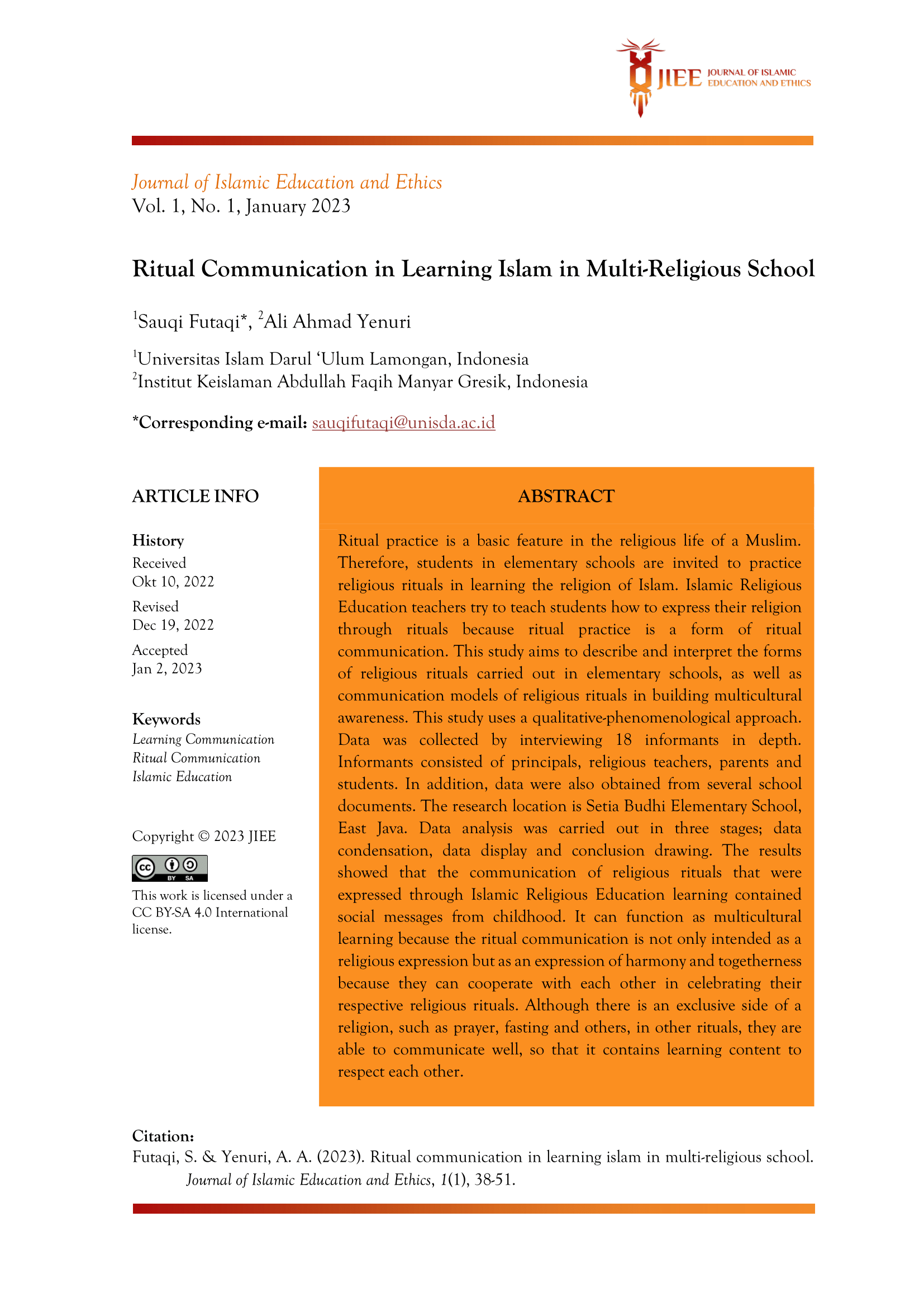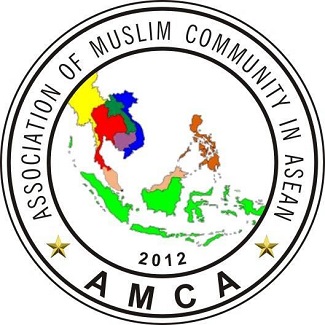Ritual Communication in Learning Islam in Multi-Religious School
DOI:
https://doi.org/10.18196/jiee.v1i1.4Keywords:
Learning Communication, Ritual Communication, Islamic EducationAbstract
Ritual practice is a basic feature in the religious life of a Muslim. Therefore, students in elementary schools are invited to practice religious rituals in learning the religion of Islam. Islamic Religious Education teachers try to teach students how to express their religion through rituals because ritual practice is a form of ritual communication. This study aims to describe and interpret the forms of religious rituals carried out in elementary schools, as well as communication models of religious rituals in building multicultural awareness. This study uses a qualitative-phenomenological approach. Data was collected by interviewing 18 informants in depth. Informants consisted of principals, religious teachers, parents and students. In addition, data were also obtained from several school documents. The research location is Setia Budhi Elementary School, East Java. Data analysis was carried out in three stages; data condensation, data display and conclusion drawing. The results showed that the communication of religious rituals that were expressed through Islamic Religious Education learning contained social messages from childhood. It can function as multicultural learning because the ritual communication is not only intended as a religious expression but as an expression of harmony and togetherness because they can cooperate with each other in celebrating their respective religious rituals. Although there is an exclusive side of a religion, such as prayer, fasting and others, in other rituals, they are able to communicate well, so that it contains learning content to respect each other.
Downloads
References
B.Miles, M., Huberman, A. M., & Saldana, J. (2014). Qualitative Data Analysis - Matthew B. Miles, A. Michael Huberman, Johnny Saldaña - Google Books. In Sage Publications.
Benny, A. P. (2009). Model desain sistem pembelajaran. Jakarta: Dian Rakyat.
Bowen, J. R., & Bowen, J. R. (2012). A new anthropology of Islam. Cambridge University Press.
Chae, H., & Choi, J. N. (2019). Routinization, free cognitive resources and creativity: The role of individual and contextual contingencies. Human Relations, 72(2), 420–443. https://doi.org/10.1177%2F0018726718765630
Cheal, D. (1992). Ritual: Communication in action. Sociological Analysis, 53(4), 363–374. https://doi.org/10.2307/3711433
Chistyakov, D. I., & Chistyakova, O. V. (2020). Ritual as a Means of Intercultural Communication BT - Proceedings of the 7th International Conference on Education, Language, Art and Inter-cultural Communication (ICELAIC 2020). 305–309. https://doi.org/https://doi.org/10.2991/assehr.k.201215.350
Coyne, C. J., & Mathers, R. L. (2011). Rituals: An economic interpretation. Journal of Economic Behavior & Organization, 78(1–2), 74–84. https://doi.org/10.1016/j.jebo.2010.12.009
Crain, W. (2007). Teori perkembangan konsep dan aplikasi. Yogyakarta: Pustaka Pelajar.
Creswell, J. W., & Poth, C. N. (2016). Qualitative inquiry and research design: Choosing among five approaches. Sage publications.
Duncan, H. D. (2017). Communication and social order. Routledge. GÜRdenfors, P. (2018). Pantomime as a Foundation for Ritual and Language. Studia Liturgica, 48(1–2), 41–55. https://doi.org/10.1177/00393207180481-204
Lüger, H.-H. (1983). Some aspects of ritual communication. Journal of Pragmatics, 7(6), 695–711. https://doi.org/10.1016/0378-2166(83)90091-7
McCroskey, J. C., Valencic, K. M., & Richmond, V. P. (2004). Toward a general model of instructional communication. Communication Quarterly, 52(3), 197–210. https://doi.org/10.1080/01463370409370192
Mohammed, B. M. N. (2017). The religious men in Jebel Marra: The process of learning and the performance of Islamic rituals and practices (Vol. 81). LIT Verlag Münster.
Morreale, S., Backlund, P., & Sparks, L. (2014). Communication Education and Instructional Communication: Genesis and Evolution as Fields of Inquiry. Communication Education, 63(4), 344–354. https://doi.org/10.1080/03634523.2014.944926
Mulyana, D. (2007). Ilmu komunikasi. Bandung: PT Remaja Rosdakarya. Preiss, R. W., & Wheeless, L. R. (2014). Perspectives on Instructional Communication’s Historical Path to the Future. Communication Education, 63(4), 308–328. https://doi.org/10.1080/03634523.2014.910605
Saldana, J. (2011). Fundamentals of qualitative research. Oxford University Press USA.
Scully, P., & Howell, J. (2008). Using rituals and traditions to create classroom community for children, teachers, and parents. Early Childhood Education Journal, 36(3), 261–266. https://doi.org/10.1007/s10643-008-0279-7
Senft, G., & Basso, E. B. (2009). Ritual communication. Berg.
Sohi, K. K., Singh, P., & Bopanna, K. (2018). Ritual participation, sense of community, and social well-being: a study of seva in the Sikh community. Journal of Religion and Health, 57(6), 2066–2078. https://doi.org/10.1007/s10943-017-0424-y
Staton‐Spicer, A. Q., & Marty‐White, C. R. (1981). A framework for instructional communication theory: The relationship between teacher communication concerns and classroom behavior. Communication Education, 30(4), 354–366. http://dx.doi.org/10.1080/03634528109378491
Stewart, R. A., & Roach, K. D. (1993). A model of instructional communication as a framework for analyzing and interpreting student ratings of instruction. Communication Quarterly, 41(4), 427–442. https://doi.org/10.1080/01463379309369903
Tavory, I., & Winchester, D. (2012). Experiential careers: the routinization and de-routinization of religious life. Theory and Society, 41(4), 351–373. https://doi.org/10.1007/s11186-012-9170-z
West, R. L., Turner, L. H., & Zhao, G. (2010). Introducing communication theory: Analysis and application (Vol. 2). McGraw-Hill New York, NY.
Wrench, J. S., Peck Richmond, V., & Gorham, J. (2009). Communication, affect, & learning in the classroom.
Wulf, C. (2011). Rituals in Education. The Berlin Study on Rituals and Gestures. The Berlin Study on Rituals and Gestures.

Downloads
Published
How to Cite
Issue
Section
License
Copyright (c) 2023 Journal of Islamic Education and Ethics

This work is licensed under a Creative Commons Attribution-ShareAlike 4.0 International License.




